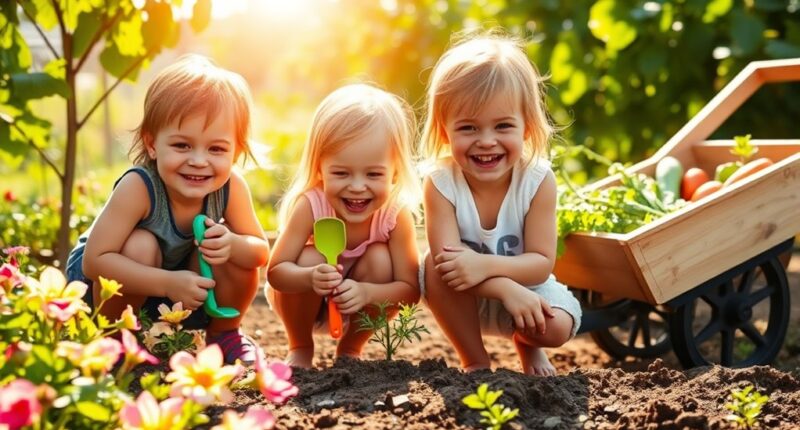Gardening with your kids is a fantastic way to bond while boosting their physical health, cognitive skills, and emotional growth. As they dig, plant, and care for their garden, they build strength and coordination. You’ll also foster responsibility and teamwork as they share tasks. Plus, there’s the joy of harvesting fresh produce together! Discover more about the benefits and creative activities that can make your gardening experience even more enriching for both you and your children.
Key Takeaways
- Gardening together fosters teamwork and communication skills as children collaborate on tasks like planting and watering plants.
- Involving children in gardening enhances their physical health through active participation and boosts their fine and gross motor skills.
- Hands-on gardening activities improve cognitive development by introducing math and science concepts in a practical, engaging manner.
- Caring for plants teaches children responsibility, patience, and empathy while providing a calming environment to reduce stress.
- Creative projects like themed gardens stimulate imagination and curiosity, making gardening a fun, family-oriented experience.

Gardening Set, Tool Kit, for Kids, STEM, Includes Tote Bag, Spade, Watering Can, Rake, Fork, Trowel and Gloves (Ocean Blue)
Fun & Educational: Have fun digging, planting and watering! This set is perfect for teaching kids the basics…
As an affiliate, we earn on qualifying purchases.
As an affiliate, we earn on qualifying purchases.
Benefits of Gardening for Physical Development
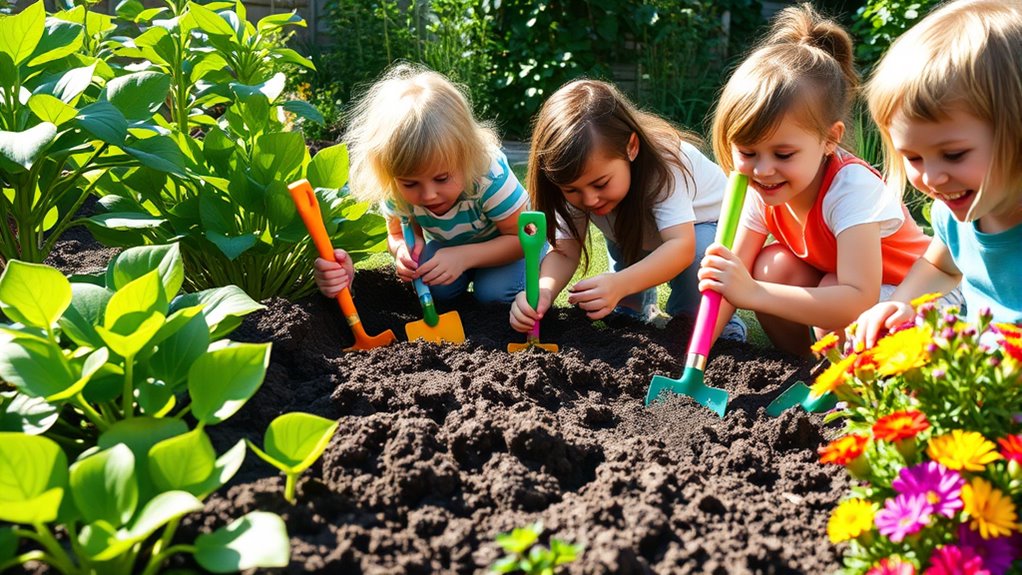
When you engage your children in gardening, you’re not just planting seeds; you’re cultivating their physical development. Through activities like pushing wheelbarrows and lifting pots, your kids build muscle strength and endurance. Tasks such as digging and weeding provide total body workouts, enhancing coordination with tools like trowels and rakes. Gardening also improves gross motor skills as they shovel soil and navigate uneven terrain. Furthermore, gardening keeps children active and moving, which helps increase energy expenditure compared to sedentary habits. They learn to balance and use large muscle groups effectively. Plus, handling delicate seedlings and using small tools refines their fine motor skills, essential for tasks like writing. Additionally, gardening can promote cooperative play among children, as they often work together to plant, tend, and harvest their crops. Furthermore, gardening involves outdoor activities that help children develop essential survival skills, like understanding the importance of nurturing plants and recognizing local ecosystems. Engaging in such activities can also introduce kids to hydrotherapy benefits, as they learn about the role of water in plant health. Moreover, spending time outdoors while gardening fosters a sense of community connection, which can contribute to their overall well-being and social skills. Additionally, working together in the garden can enhance their emotional well-being, as they experience the joy of creating and nurturing life.

Grenebo Kids Gardening Set Toys, Quality Garden Tool Kit for Kids and Toddlers, Includes Two Shovels, Garden hat,Rake, Apron,Gloves, Watering Can, and Tool Bag (Pink)
Kids' Exclusive Gardening Set: Designed specifically for children, toddler gardening set features lightweight tools with easy-to-grip handles and…
As an affiliate, we earn on qualifying purchases.
As an affiliate, we earn on qualifying purchases.
Enhancing Sensory and Emotional Growth Through Gardening
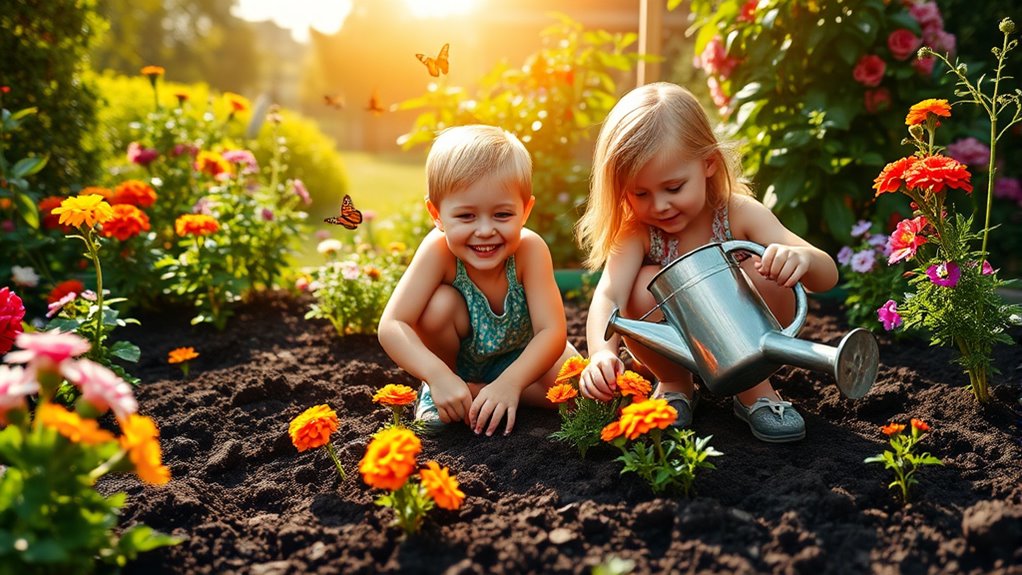
Gardening not only nurtures plants but also enriches children’s sensory and emotional development. As you dig into the soil, your child experiences various textures and enhances their fine motor skills. The vibrant colors of flowers and plants sharpen their visual perception, while the delightful aromas evoke emotional responses and memories. Listening to nature’s sounds fosters auditory discrimination, creating a full sensory experience. Additionally, gardening offers hands-on learning about science and plant life cycles, reinforcing their understanding of the natural world. Engaging in gardening can also help children develop patience and responsibility, as they witness the growth of their plants. Furthermore, gardening can instill a sense of financial considerations as families may discuss the cost of seeds and supplies, providing children with early lessons in budgeting and resource management. Moreover, gardening teaches patience and responsibility as children witness the growth of their plants, enhancing their ability to cope with good grief in times of loss. This calming environment helps reduce stress and anxiety, allowing for emotional regulation.

LveSunny Kids Gardening Gloves, 2 Pair Toddler Gardening Gloves, Girls Glove, Rubber Non-Slip Safety Work Gloves for Kids, Youth, Garden, Fishing, Cycling and Gardening Tools (Ages 3-5)
Safety & Protection: Rubber coated gloves provide non-slip grip and puncture resistance, ensuring kids' hands stay safe during…
As an affiliate, we earn on qualifying purchases.
As an affiliate, we earn on qualifying purchases.
Academic Advantages of Engaging in Gardening
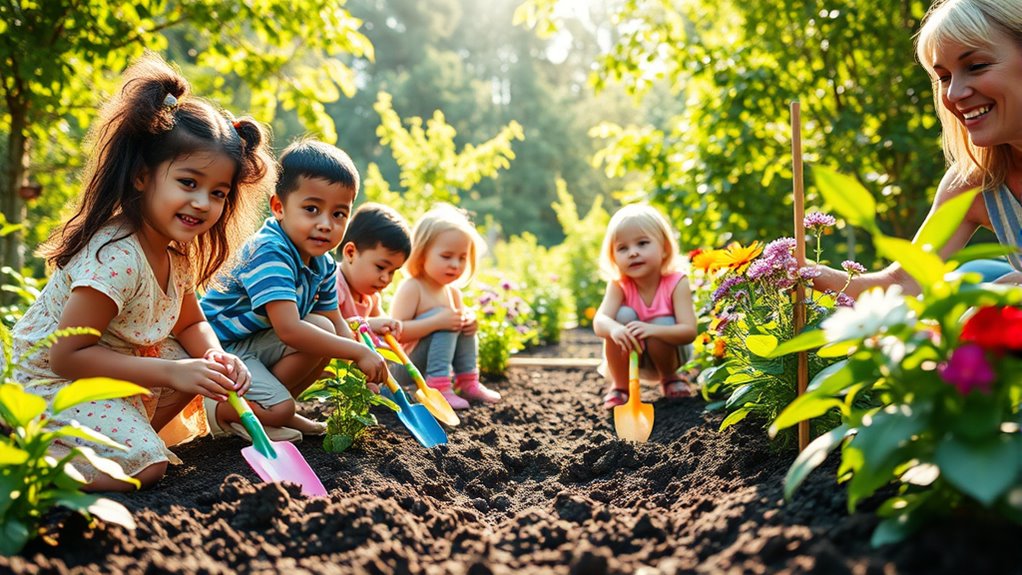
Experiencing the benefits of gardening goes beyond sensory and emotional growth; it also opens doors to significant academic advantages. When you engage your children in gardening, you’ll notice improved science scores and enhanced curiosity about the natural world. Gardening provides hands-on learning that makes complex concepts like botany and ecology come alive. Your kids develop critical thinking skills as they observe and solve problems like pest control and nutrient needs. Additionally, research indicates that students in garden-based science curricula score higher on science tests than those in traditional classrooms. Engaging with nature can also foster a sense of environmental stewardship, which is essential for future generations. Furthermore, gardening encourages children to practice required minimum distributions of their time and resources, teaching them valuable lessons about planning and patience. Moreover, incorporating gardening into their education can promote an understanding of advance directives, which is vital for making informed decisions about future responsibilities.
In addition, gardening teaches children about the importance of budgeting their resources effectively, as they learn to allocate water, soil, and nutrients for optimal plant growth. Furthermore, gardening can enhance their knowledge of newborn feeding options, as they learn to understand the growth needs of plants and how they relate to nutrition. Plus, gardening can be integrated across subjects such as math and literature, creating a multidimensional learning experience. They’ll also improve their observation and data recording skills, fostering scientific literacy. Ultimately, gardening not only motivates them academically but also imparts essential life skills they’ll carry into the future.

DUYOYU Kids Plant Growing Kit – Kids Greenhouse & Flower Growing Kit with Upgraded Irrigation & Grow Light – Perfect Gardening for Kids(Solar Green)
【Mini Garden Experience: Build, Plant, and Observe】Our kid gardening kit allows children to experience the entire plant growth…
As an affiliate, we earn on qualifying purchases.
As an affiliate, we earn on qualifying purchases.
Building Social and Interpersonal Skills in the Garden
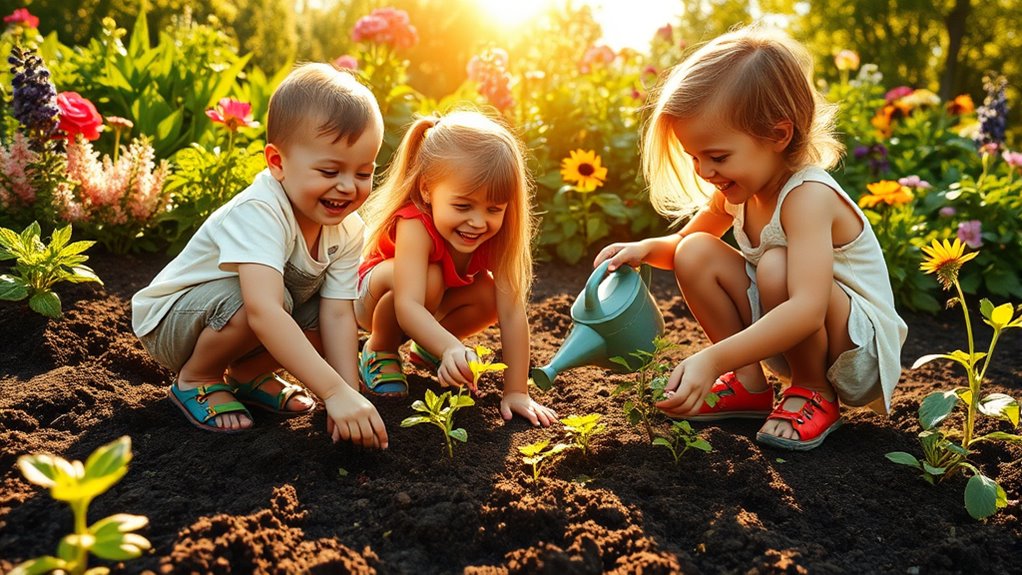
How can working together in a garden transform your child’s social skills? Gardening teaches teamwork as kids share responsibilities like planting and watering, requiring them to collaborate. They communicate openly, discussing plans and solving problems together, which strengthens their ability to express themselves and listen. By dividing tasks based on strengths, children learn the significance of each role in the garden’s success. Engaging in gardening also develops fine and gross motor skills through hands-on tasks, enhancing their physical coordination while working with others. Participating in group gardening activities can also be complemented by educational and skill-building toys that further encourage collaboration and problem-solving. Incorporating Montessori toys into gardening activities can enhance children’s understanding of real-world skills and practical life activities. Additionally, working in the garden can teach children about sustainable practices, promoting awareness of environmental responsibility. For instance, they may learn to care for farm animals, which can cultivate a sense of empathy and responsibility towards all living things. Using self-watering planters can also help children understand the importance of consistent moisture levels for healthy plant growth. Celebrating collective achievements reinforces teamwork and mutual respect. Engaging in group gardening activities fosters empathy as children learn to care for living things. This shared experience not only builds relationships with peers and adults but also strengthens family bonds. Ultimately, gardening nurtures essential social skills and cultivates a sense of community.
Promoting Health and Nutrition With Homegrown Produce
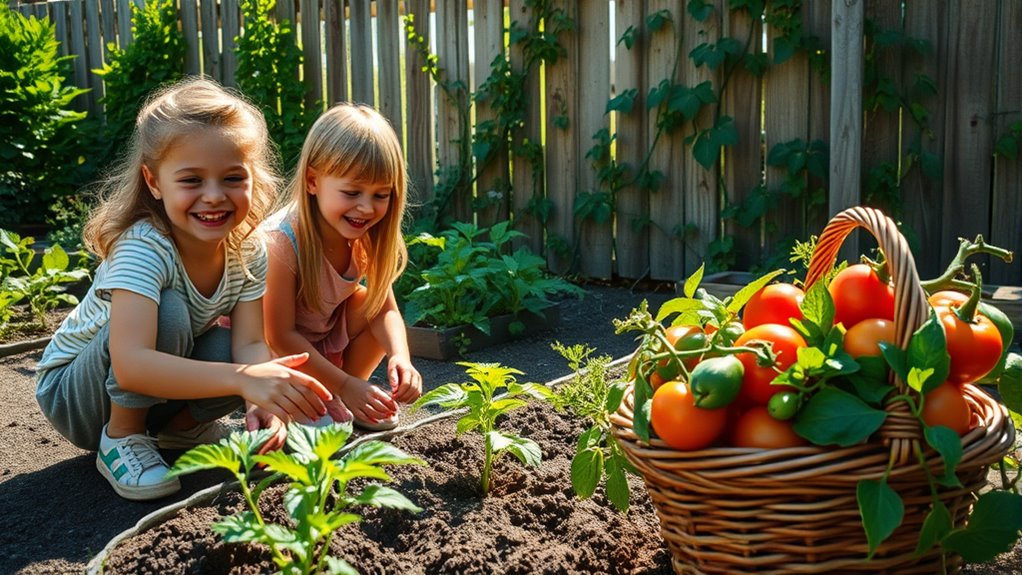
While many children may not realize it, growing their own food can greatly boost their health and nutrition. When kids help cultivate their own fruits and vegetables, they’re more likely to consume fresher, nutrient-rich produce, improving their overall diet. Gardening also exposes them to lower pesticide levels, supporting their immune systems and overall health. Plus, the physical activity associated with gardening enhances their fitness and vitamin D levels. Engaging children in this process fosters a deeper understanding of food sources, making them more inclined to eat what they grow. As they learn about nutrition through hands-on experience, they develop healthier eating habits that can last a lifetime. Additionally, gardening fosters a love of nature and connection to the natural world, enriching their overall development. Moreover, growing baked kale can introduce children to nutrient-dense options, as this leafy green is rich in vitamins A, C, and K, and provides fiber content that supports digestive health. Involving children in planting best daisy varieties can also spark their interest in gardening while attracting beneficial pollinators to the garden. Furthermore, incorporating chia seeds into their gardening experience can provide them with essential nutrients that promote heart health and digestion. Chia seeds are also a rich source of dietary fiber, which aids in digestion and promotes regularity.
Fostering Cognitive and Emotional Development
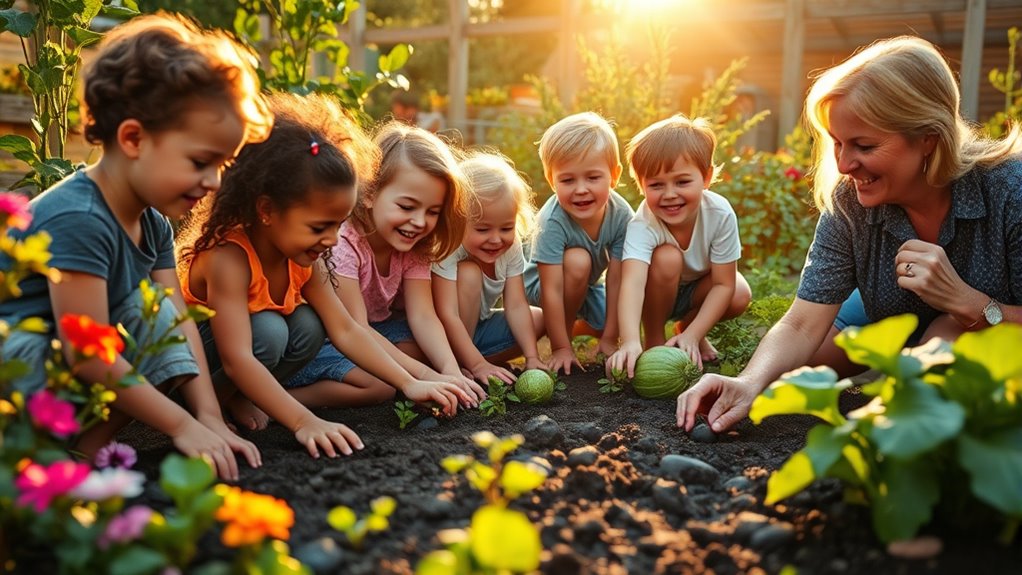
Engaging children in gardening not only nurtures their health through fresh produce but also plays a significant role in their cognitive and emotional development. As kids tackle common garden issues like pests, they enhance their problem-solving skills and critical thinking. Focusing on tasks like planting and harvesting helps improve their concentration, while sustainable gardening practices encourage a deeper understanding of the environment. Gardening introduces them to basic math and science concepts, making learning fun and practical.
Emotionally, caring for plants fosters responsibility and teaches patience as they wait for growth. Watching their efforts yield results boosts their self-esteem. Additionally, the calming nature of gardening reduces stress and cultivates empathy towards living ecosystems. Through emotional regulation experiences, children develop essential skills that benefit their overall growth and emotional well-being.
Creative Gardening Activities for Children
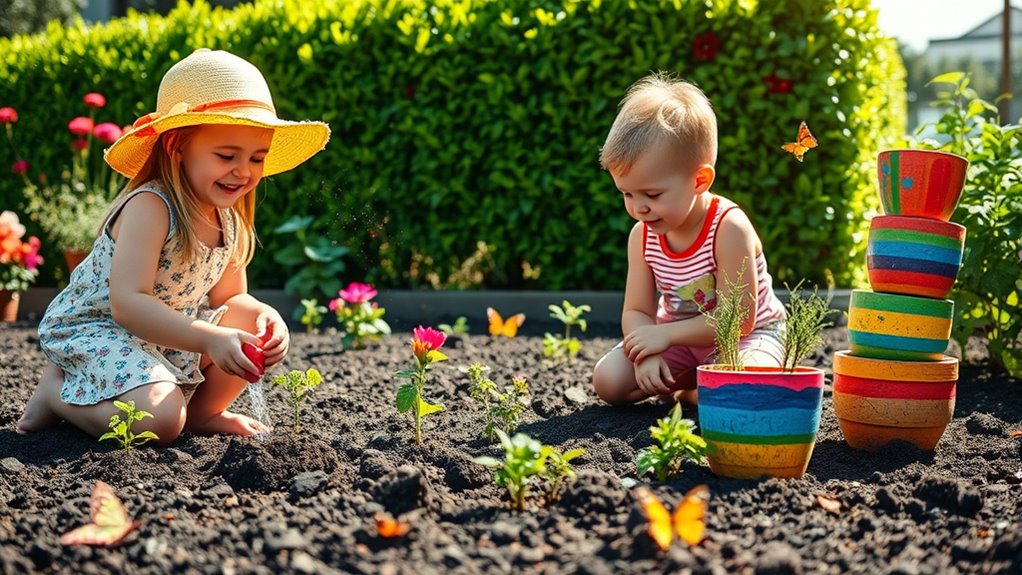
Gardening can be a fantastic adventure for children, sparking their creativity and curiosity. You can engage them with projects like creating a fairy garden using stones and twigs, or building a dinosaur herb garden with figurine plant markers.
Encourage imaginative play by constructing a twig teepee, providing a unique outdoor space. Making a terrarium lets kids design their mini ecosystems, while a bug box fosters curiosity about local wildlife.
Constructing a twig teepee sparks imaginative play, while terrariums and bug boxes nurture curiosity about ecosystems and wildlife.
You can also inspire writing skills through garden journaling or promote sensory exploration with a sensory garden. Create fun themed gardens like a vegetable pizza garden or a butterfly garden, blending creativity with learning about nutrition and biodiversity.
These activities make gardening a joyful and educational experience!
Tips for Successful Gardening With Kids
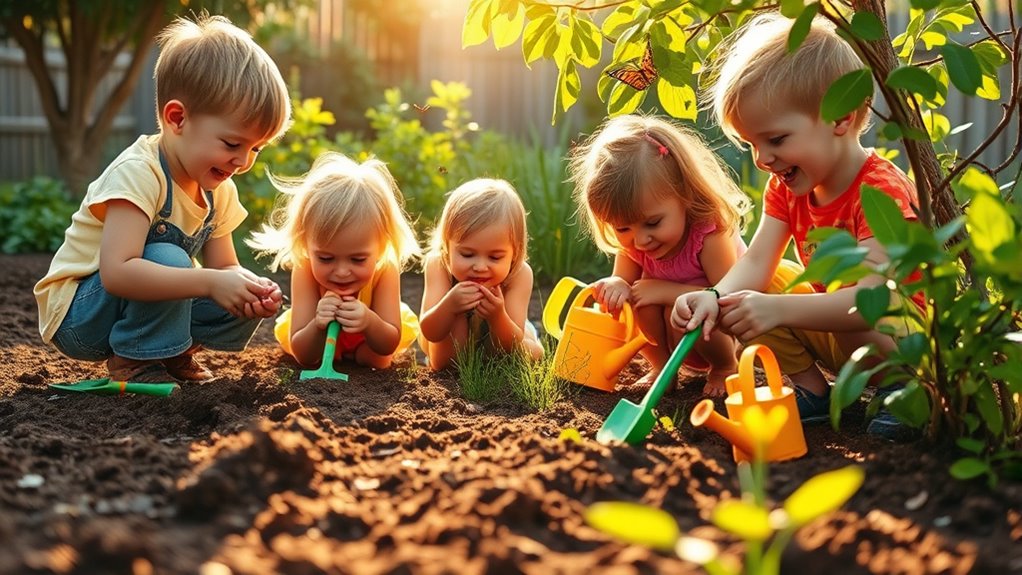
To guarantee a successful gardening experience with kids, it’s vital to involve them in every step of the process, from planning to planting. Start by researching plants together and selecting easy, fun options like sunflowers and beans.
Have your kids draw a simple garden layout, considering plant placement. Assign each child a small area to manage, fostering ownership and responsibility.
Integrate sensory experiences and incorporate their interests to keep them engaged. Teach them essential gardening skills and connect lessons to science, math, and literacy.
Celebrate the harvest as a family, emphasizing patience and teamwork. By recognizing their contributions and encouraging participation, you’ll help build their confidence and appreciation for nature.
Frequently Asked Questions
What Types of Plants Are Best for Children to Grow?
When you’re looking for plants that are best for children to grow, consider easy-to-manage options like sunflowers, zinnias, and marigolds for flowers.
For vegetables, radishes and peas are quick to harvest, making them exciting choices.
If you’re after interactive plants, think pumpkins or strawberries; they’re fun and engaging.
Herbs like basil can teach kids about cooking.
These plants provide a hands-on experience that keeps kids interested and learning throughout the growing season.
How Can I Keep Gardening Fun and Engaging for Kids?
To keep gardening fun and engaging for kids, think of it as a grand adventure!
Create specialized gardens, like a fairy or dinosaur-themed space, to spark their imagination. Let them build bug boxes or manage their own tiny terrariums.
Encourage sensory exploration with hands-on tasks and themed projects that align with their interests. Celebrate each small victory, and remember, mistakes are just stepping stones to success.
With creativity, the garden can truly come alive!
What Tools Are Safe for Children to Use in Gardening?
When considering tools safe for children in gardening, look for child-sized options that fit their small hands.
Choose tools made from non-toxic materials, like BPA and phthalate-free plastics. Guarantee they’ve rounded edges and soft handles to minimize injury risks.
Brands like Back to the Roots and GardenBee offer great kits.
Always supervise your child while they use tools, and encourage them to inspect tools for damage before starting any gardening tasks.
How Can I Incorporate Gardening Into Homeschooling or Remote Learning?
You can easily incorporate gardening into your homeschooling by setting up a small garden space or using pots.
Start your day with gardening activities to establish a routine. Let your kids choose easy-to-grow plants like beans or sunflowers, making the experience more engaging.
Connect gardening tasks to lessons in science and math, and encourage them to document their progress.
This hands-on approach not only teaches responsibility but also fosters a love for nature and learning.
What Are Some Common Gardening Mistakes to Avoid With Children?
Imagine the joy of watching young hands dig in the soil, only to witness disappointment from the common mistakes you could easily avoid.
Don’t overcrowd plants; they need space to thrive. Use child-friendly tools to empower your little gardeners. Make certain you label each plant to prevent confusion.
Finally, involve them fully to spark their interest and create lasting memories. Gardening should be a joyful journey, not a source of frustration!
Conclusion
Gardening with your kids isn’t just about getting your hands dirty; it’s a journey of growth that nurtures both plants and relationships. As you dig, plant, and harvest together, you’re not only cultivating a garden but also blossoming memories and skills that last a lifetime. So, roll up those sleeves, embrace the dirt, and watch as your little ones flourish alongside their green creations. After all, every seed sown is a lesson in life waiting to sprout!
